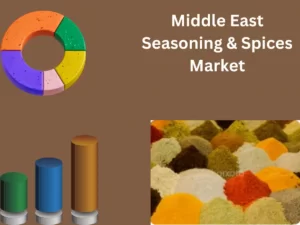© 2024 All rights reserved
Datavagyanik- Your Research Partner

The Middle East is renowned for its extensive and varied culinary customs, which place a strong emphasis on the use of spices and condiments. As a result, there is a huge market for spices and seasonings in the area. Middle Eastern food is one of the most sought-after cuisines in the world due to the distinctive flavour and scent that comes from the special combination of spices and ingredients.

The growing ubiquity of Middle Eastern cuisine across the globe might also be linked to the rising need for spices and condiments. Due to their frequent use in Middle Eastern cuisine, spices including cumin, coriander, turmeric, and cinnamon are in high demand. Additionally, spices such as za’atar, sumac, and baharat are becoming more popular in other parts of the world, as consumers seek out new and exciting flavours.
The Middle East’s changing culinary customs and expanding population are further factors influencing the region’s demand for seasoning and spices. The demand for natural and organic spices and seasonings is rising as more customers hunt for wholesome and flavorful culinary options. As a result, fresh and cutting-edge goods like low-salt seasoning blends and organic spice blends have been introduced to the market.
The Middle East is the world’s largest producer of spices and seasonings, accounting for more than 50% of global production.
The most popular spices and seasonings in the Middle East include cumin, coriander, cardamom, turmeric, cinnamon, nutmeg, saffron, and sumac.
The Middle East’s dynamic and diversified food culture, which features a diversity of cuisines from throughout the world, is another factor driving the demand for seasonings and spices in the area. There is a wide variety of items on the market since the demand for certain spices and seasonings varies across various cuisines.
In conclusion, the seasoning and spices market in the Middle East is a crucial component of the region’s culinary culture, driven by its diverse food traditions and growing demand for natural and organic products. The market is expected to continue to grow, driven by the region’s expanding population, changing dietary habits, and increasing demand for new and innovative flavours.
Seasonings and spices are a fundamental part of Middle Eastern cuisine, and as such, the seasoning and spice market is in high demand in the region. Spices and seasonings are used to enhance the flavour and scent of food as well as its appearance. The Middle East is a melting pot of various cultures, each of which has its culinary methods and special combinations of spices and ingredients.
Spices, herbs, salt, and salt alternatives are all part of the seasoning and spice sector. Herbs come from the leafy section of plants, whereas spices are made from the roots, seeds, fruits, and other parts of plants. The market for seasonings and spices also includes salt and salt alternatives because they are frequently used in cooking as seasonings. The form of the seasoning, which might be whole, crushed, or powdered, is another way to divide the market.
Spices are the most significant segment of the seasoning and spice market in the Middle East. Popular spices used in the region include cumin, coriander, turmeric, paprika, cinnamon, and black pepper. These spices are used in different forms such as whole, ground, or roasted, and are added to a wide variety of dishes, ranging from meat and vegetable dishes to soups and stews. Herbs such as thyme, parsley, mint, and sage are also used in Middle Eastern cuisine and are often combined with spices to create unique flavour profiles.
In addition to their use in traditional Middle Eastern cuisine, seasonings and spices have also gained popularity in the region as consumers become more adventurous and seek out new tastes and flavour combinations. The seasoning and spice market has expanded to include blends from other regions, such as Indian and Southeast Asian spices, as well as exotic herbs such as saffron and sumac. The increasing popularity of healthy eating and plant-based diets has also led to a rise in demand for salt substitutes and herbs.
In summary, the seasoning and spice market in the Middle East is essential for the region’s cuisine and culture. The market includes a wide variety of spices, herbs, and salt substitutes used in cooking, and is continually expanding to include new and exotic blends. The Middle East’s diverse culinary traditions, coupled with consumers’ growing interest in healthy and flavorful food options, make this market an essential part of the region’s food industry.
The Seasoning & Spices market in Saudi Arabia is growing due to the increasing demand for traditional and international flavours. The country has a large population of expatriates from different countries, which has led to an increased demand for a variety of spices and seasonings. Additionally, the Saudi government has been encouraging the development of local food production, which has further increased the demand for spices and seasonings.
The UAE Seasoning & Spices market is also growing due to the increasing number of tourists visiting the country. The UAE is known for its diverse cuisine, which includes a variety of spices and seasonings. Additionally, the country’s strategic location between Europe, Africa, and Asia makes it an ideal destination for tourists looking to experience different flavours from around the world. This has led to an increased demand for a variety of spices and seasonings in the UAE.
The middle east seasoning & spices market has been segmented into Products and Forms.
Based on the Products, the middle east has a seasoning & spices market for Spices, Herbs, and Salt & Salts Substitutes. In 2021, the Spices segment held a significant share. This is likely due to the increasing demand for spices in the food industry and the growing popularity of cooking at home. Furthermore, the rising health consciousness among people has led to an increased demand for spices, as they are known to be beneficial for health. This trend is expected to continue in the upcoming years, as people continue to prioritize health and experiment with different recipes at home.
Based on Forms, the market is classified as Whole, Crushed, and Powder. In 2021, the segment is expected to account for a significant share of Powder. Powdered spices also have a longer shelf life compared to whole or crushed variants, making them more suitable for mass production and distribution. However, whole or crushed spices may be preferred by some consumers for their stronger aroma and flavour, as they retain their essential oils and other aromatic compounds better than their powdered counterparts.
By Product
By Form
By Region
“Every Organization is different and so are their requirements”- Datavagyanik







© 2024 All rights reserved
Datavagyanik- Your Research Partner
Add the power of Impeccable research, become a DV client